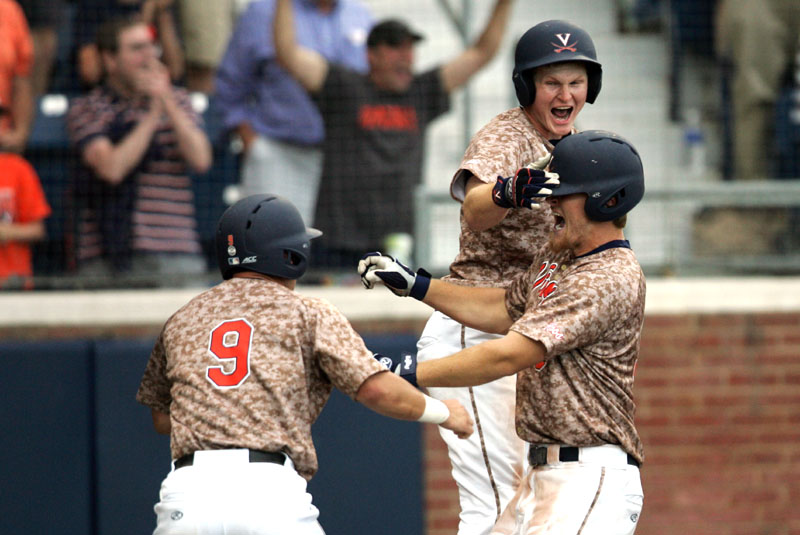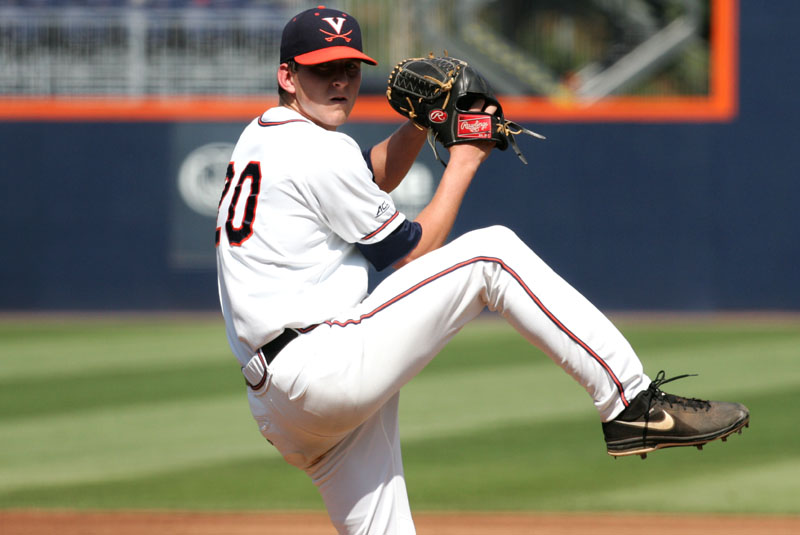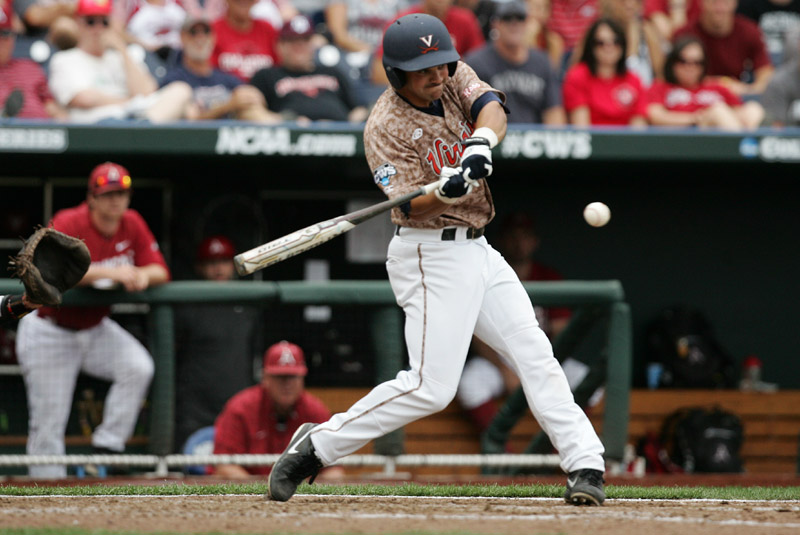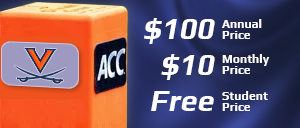
Back in February, my Virginia baseball preview was posted on TheSabre.com. In that article, I discussed how Cavalier baseball had reached the rarified air of a college baseball superpower and how head coach Brian O’Connor, associate head coach Kevin McMullen, and pitching coach Karl Kuhn built that powerhouse.
The piece explained how the trio set out 12 years ago to create a culture that would become UVa baseball. The article was intended to be an analysis of how that culture would lead to continued NCAA Tournament berths, regional and super regional titles, and frequent trips to Omaha for the College World Series.
That included 2015.
As I looked down the road through the season, I expected another ho-hum, garden variety trip through a 20-plus win ACC season, another 40-plus win regular season, and sitting home on my couch on selection Monday to see who would join the top-eight seeded Cavaliers in Charlottesville for the NCAA Tournament regional.
Why? That is the expectation for this program. That is its culture.
Reflecting back on the 2015 National Championship season, in a year plagued by significant injuries, weather conditions that forced “home” baseball games to played as far as 500 miles away from Charlottesville (about half the distance to Omaha) and a squad where draft picks and injuries demanded contributions from numerous first-year players, I realized a story chronicling the culture created by O’Connor was more relevant this season than I could have imagined. It’s a major component of UVa’s baseball success
O’Connor’s original plan, the culture he envisioned for the Virginia program, the plan that sold Director of Athletics Craig Littlepage on hiring O’Connor at the beginning? That was instrumental to Virginia’s 2-1 College World Series win over the Vanderbilt Commodores.
“It wasn’t just a plan that he had in his head and he was able to articulate that plan to me, he also had his plan written,” Littlepage said recently at the welcome home event for the team at the John Paul Jones Arena. “He was able to go through from recruiting to academics to scheduling to player development. He went right down the line and had everything teed up perfectly in terms of how I viewed the needs for our program.”
When the 2015 campaign started, the Hoos were expected to earn a return trip to Omaha because that is culture of Virginia baseball. Those are the expectations year in and year out. All-Americans Joe McCarthy, Brandon Waddell, and Nate Kirby were back plus 2014’s leading hitter John LaPrise. All five major baseball ranking services had the 2014 CWS runner-up ranked among their top four teams.
Then injuries hit. McCarthy was out before opening weekend for 12 weeks with back surgery and LaPrise was lost for the season after playing just four games with a hip injury. Later, Kirby missed eight weeks from a strained left lat muscle. Those were the major injuries to headliners. In all, projected or opening day starters missed 154 games this season due to injuries.
Those injuries led to club team additions to fill out the roster and forced numerous freshmen and previous role players to step up and contribute heavily. Which, of course, brings us back to the importance of the UVa baseball culture.

As is the case with most college sports, recruiting is the life-blood of your program. In college baseball, where at places like Virginia star players typically are drafted and depart after their junior seasons, keeping your talent pipeline full of players that have the ability to step in and play right away is essential.
In January, O’Connor told me, “We’ve worked hard to establish the process and made a conscious effort in recruiting over the years to be very consistent. Players move on and now it’s the next player’s opportunity to make their mark. To show they’re the leaders of Virginia baseball and show what they are capable of on a consistent basis.”
And there were plenty of opportunities. Of the 544 position player starts this season, rookies started 44% of the time (238 starts), combined to score 42% of Virginia runs, produced 38% of the RBIs, and collected 42% of the hits.
In the College World Series Finals, rookies came up huge as well. Adam Haseley took the mound and produced five innings of shutout baseball in game two to pave the way for CWS MVP Josh Sborz to toss a four-inning save and keep the Hoos alive. Ernie Clement’s three hits included the go-ahead RBI single in the sixth inning to plate the only run Virginia needed in 3-0 win.
Haseley’s pitching effort was considered by many to be the turning point of the title series. A centerfielder and leadoff hitter for most of the season, many viewers may not have realized that Haseley had pitched well in limited action since the end of April, including a solid start against NC State in the ACC Tournament.
In the series finale it was freshman Pavin Smith that rose to the occasion. His two-run home run tied the game at 2-2 in the fourth. His RBI single in the fifth plated Haseley and gave the Hoos the lead for good at 3-2 as they went on to win 4-2.
With that, Virginia finished the unexpected. A regional three-seed loaded with freshmen, claimed UVa’s first NCAA baseball crown against a heavily favored Vanderbilt club. The culture of Virginia baseball is that the program is expected to compete for a national title and freshmen – or anyone that is called on really – are expected to contribute.
Revisiting the February article, Waddell said this:
“You look at the young guys, you know they’re going to play, you know they’re going to have big roles, there will be times when the game is in their hands and they’re going to need to step up,” Waddell said. “It doesn’t really matter what year you are, if you’re going to play, then you need to step up and do it.”
There’s a Nostradamus moment for you.
The fact that the freshmen were such an integral part of the team’s success was not lost on Littlepage.
“I think the unique aspect of this team was we not only had these disruptions and distractions in terms of injuries, but they were injuries to multiple key players,” Littlepage said. “Time after time, somebody stepped up, somebody stepped in, somebody moved from the outfield to the infield, somebody moved from the bench to a pinch hitting role. Everybody seemed to kind of get it. Everybody stretched themselves to be able to accomplish what they accomplished this year.”

That was the first piece of O’Connor’s building project: establish high expectations and then find players to be a part of it. The second component of the O’Connor culture was also on display in 2015. Consistency.
O’Connor’s first goal in building a winning tradition and brand at Virginia was to become a perennial participant in the NCAA Tournament. The idea being you can’t play for a CWS title if you don’t earn a spot in the tournament. That goal was met the first year O’Connor took the helm in 2004 and has been met every year since. UVa owns the sixth-longest NCAA Tournament streak among teams in Division I baseball with those 12 straight appearances.
It wasn’t until the sixth season of O’Connor’s tenure, however, that Hoos finally broke through and won a regional title in 2009. That season Virginia also claimed its first Super Regional crown and first trip to the College World Series. The Hoos went 1-2 that year in Omaha but the next step in the process had been achieved.
With those two building blocks in place, the final step would be the most difficult. Break through in Omaha.
In the six seasons since that first trip to the College World Series, the Hoos returned to TD Ameritrade Park three more times. Just as consistency in terms of getting into the NCAA Tournament was part of the plan, so too was regularly getting back to Omaha. UVa and Florida are the only schools to appear four times in Omaha since 2009.
So make no mistake, while this season did not feature smooth sailing throughout, the Hoos did not arrive in Omaha “just happy to be here” and content to go back to Charlottesville with some lovely parting gifts. No, this club came to Nebraska to win a CWS title. Remember, that’s the underlying culture to the whole program. The road traveled wasn’t the cruise control, No. 1 seed interstate of 2014, but according to Waddell, the ultimate goal, an NCAA Championship, was still the same.
“Our expectations inside the locker room from year to year haven’t changed,” Waddell said.
As the season wore on, not everyone felt that way about the 2015 Hoos. Remember those publications that had Virginia ranked in the top five at the beginning of the season? None of them predicted a CWS title in late May or even on June 13. They saw the struggles, a down year for the pitching staff, and the losing streaks from the season. NCAA Tournament history also suggested UVa wasn’t likely to make a run. Virginia became only the third champion to lose the first game of the CWS Finals, and then win the next two games, joining Oregon State (2006) and Fresno State (2008). The Beavers and Bulldogs were the only lower regional seeds to win a CWS title, as well.
So for the media, broadcasters, and pundits who called the three-seeded Virginia’s title run improbable, they can be forgiven. It’s rare.

Senior and All-Tournament selection third baseman Kenny Towns, however, understood the fabric and culture of Virginia baseball. He understood the expectations at Virginia even if the regular season didn’t unfold as anticipated. He knew the NCAA Tournament was a new opportunity.
“One thing that Coach O’Connor always reminded us that even though things might not be going that well, all our goals are in front,” Towns said. “Coach O’Connor and the other coaches kept preaching to us … you’ve just got to grind through it. We had a lot of ups and downs during this year, but they didn’t expect less out of us. They kept their expectations high on us, and just told us to grind it out.”
Adversity, injuries, rookies? The expectation remains the same. That culture is what put Virginia in position to make a run to the National Championship against the odds.
The pundits bet against the Hoos to the very end, but not the players and coaches in the UVa locker room. The players have been exposed to the culture of winning and the expectations since they were recruited and it has been the responsibility of the veterans to reinforce the UVa brand of baseball.
Players like Kirby understood that legacy, the impact and contribution of the players that came before him. Players like Mike Papi, Nick Howard, Nate Irving, and Derek Fisher who left Omaha last season without a title after falling in a decisive game three. Players that paved the way for the Hoos’ first championship this season.
“I think last year it was sad to see the guys that had put three years and four years before us go,” Kirby said. “And I think the thing that was really gratifying to me was knowing that we were playing not only for the guys on the team and the coaching staff and the fans but for everyone that’s walked between the lines before us in this program. And I think that was probably the most gratifying thing is knowing that all our hard work and their hard work paid off because they passed down a lot what we’ve learned and a lot of what the experiences the coaches have had and gone through have taught us, so I think that was probably the most gratifying thing.”
So what’ next?
The same thing. Recruit the right players. Remain consistent. Set high expectations and win at a high level. Return to Omaha regularly. Pass down that legacy to the next wave of future Cavaliers. That culture will lead to more title opportunities.
Two seniors (Towns and Thomas Woodruff) are gone. Juniors Kirby, Waddell, McCarthy (already signed), Sborz, and LaPrise (already signed) are headed to professional baseball. The only question is whether or not draft eligible sophomore shortstop Daniel Pinero, a 36th round (1,090th overall) selection by the Detroit Tigers, will return for his junior season.
The expectations won’t change, however, for the program and players like Matt Thaiss, Connor Jones, Kevin Doherty, and David Rosenberger.
Again from the preseason article:
“O’Connor, McMullen, and Kuhn put a process in place that embeds itself in every new player. That process includes consistency in recruiting, coaching, academics, pitching, and leadership. And it has evolved into to a very special baseball product.
Towns may have said it best.
“It’s a tradition, a culture of doing things the right way and that was crucial during my time here, I don’t think it was different before I got here and I don’t think it’s going to be any different after I leave.”
Towns is correct. As long as O’Connor is here, those core principals won’t change. The 2015 season only reinforced that fact. Last year, when everything went right, Virginia made it to the 2014 CWS Finals. In 2015, when if it could go wrong, it did, Virginia returned to the same stage against the odds. From there, the fabric, the culture, the brand, the essence of UVa baseball lifted the Hoos to a National Championship.




both articles are excellent-thanks Greg!
Good story.
I noticed that the word “the” was left out in at least three places. I’m not trying to nit-pick but wanted to mention it in case editing or spellchecking software was unintentionally deleting this particular article for some reason.
If you see an edit, can you email us to let us know? We can fix things quickly.